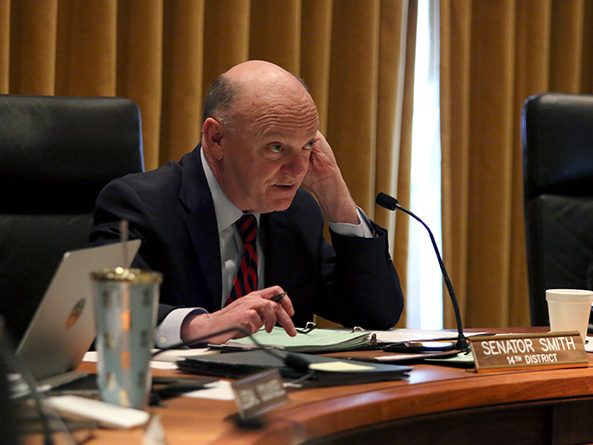Bills would restore personal exemption credit
The Revenue Committee heard testimony Feb. 7 on two bills intended to offset state revenue increases as a result of recent changes to federal tax law.
The Tax Cuts and Jobs Act, which Congress passed in December, makes many changes to the federal tax code. Papillion Sen. Jim Smith, sponsor of LB1090, said that because Nebraska’s tax law is tied to the federal code in several places, automatic changes to the state’s tax code would generate approximately $220 million in additional state revenue in 2018.
He said the most significant change is the repeal of the federal personal exemption, which is tied to a state exemption credit. To offset this change, LB1090 would create a new $134 state personal exemption credit that individuals could claim for themselves and each of their dependents beginning in 2018.
Congress also made changes to itemized deductions, exemptions for capital expenditures and the federal standard deduction. To offset those changes, Smith said, LB1090 would adopt a higher Nebraska standard deduction of $6,750 for single taxpayers and $13,000 for those who are married filing jointly.
It also would adjust individual income tax brackets, the personal exemption credit and the standard deduction based on the Consumer Price Index instead of the new federal method for indexing tax brackets for inflation.
The state Department of Revenue estimates that the bill would reduce state tax revenue by $326 million in fiscal year 2018-19 and a further $257 million in FY2019-20.
Bruce Bohrer, speaking on behalf of the Lincoln Chamber of Commerce, testified in support of the bill, saying he agrees with the effort to offset any impact that changes to the federal tax code could have on the amount of state taxes that Nebraskans pay. If the state is going to collect more revenue from its citizens as a result of the federal changes, he said, senators should debate and vote on such a measure instead of letting those changes happen automatically.
“I know there’s been some talk of just letting this happen,” Bohrer said. “Some people would call it a windfall—some people would call it a tax increase.”
LB1048, introduced by Omaha Sen. Burke Harr, also would create a state personal exemption credit that some Nebraskans could use to reduce their state income tax liability during years in which personal exemptions are not allowed on the federal tax return.
Only those with federal adjusted gross incomes of up to $100,000—or $200,000 if married filing jointly—would qualify. An individual would be allowed to claim an exemption for himself or herself, any dependents and the individual’s spouse in certain circumstances.
The department estimates that LB1048 would reduce state tax revenue by approximately $259 million in FY2018-19 and a further $196 million in FY2019-20.
Harr said his bill is more conservative than LB1090 because it would retain more of the increase in state tax revenue caused by the federal changes. This would give the state more certainty about its revenue during the current budget shortfall.
Tiffany Joekel, policy director at the OpenSky Policy Institute, testified in support of the bill, saying that it is difficult to predict how taxpayers will react to such a major change in tax policy at the federal level.
LB1048 would avoid the majority of the tax increase that would occur if the Legislature makes no changes to the state tax code, Joekel said, but it also would provide a greater margin of error than LB1090, which is meant to be revenue neutral.
No one testified in opposition to either bill, and the committee took no immediate action on them.


